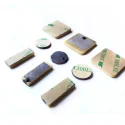2022-10-20
With the development of the Internet of Things industry, RFID technology is gradually popular and applied in our daily life, bringing convenience and speed to people's life. The essence of RFID (Radio Frequency Identification) is to use radio frequency technology (RF) to realize the identity and information.
The retail supply chain ranges from procurement, storage, packaging, loading and unloading, transportation, distribution, and sales to service. Enterprises accurately must grasp the flow direction and change of the whole business flow, logistics, information, flow, and capital flow in real-time and accurate RFID effectively provides the retail industry with the input and output of business operation data, the control and tracking of business processes, and the reduction of the error rate. As a result, RFID technology is quite attractive to retail, focusing on logistics and inventory management, and the retail giants have poured great enthusiasm into it.
This article will review the four major application scenarios of RFID labels in the retail industry.
Scenario One: RFID labels used in supply chain management and supermarkets
In recent years, the rapid development of RFID technology and the application of RFID labels have brought leapfrog development opportunities for supply chain management in the retail industry. With Wal-Mart, Marks & Spencer, Metro, Albertson, Target and other international retail giants have successively released the mandatory use of RFID supply chain management technology, the competition between the finished product supply chains has become the key to the success or failure of the future competition in the retail industry.

Scenario Two: RFID labels application in inventory management of shoe and clothing retail enterprises
With the increasing penetration rate of RFID electronic tags in the retail industry, clothing has gradually begun to introduce RFID technology in the whole management system. It is expected that the penetration rate will grow rapidly in the next few years. Data show that at the end of 2016, the global clothing-dominated chain retail industry needed more than 5 billion RFID labels. For example, foreign Decathlon, ZARA, Uniqlo, Domestic Heilan Home, La Chapelle, UR, and so on have fully implemented RFID projects.
There are two reasons why RFID electronic tag is highly used in the clothing industry: First, the labels in this scenario are consumables, and the mission of the electronic label flow to the end is completed; the other reason is that the average cost of a single electronic label in this application scenario is less than 1 yuan, which is generally less than 1% for the selling price of a garment.

Scenario Three: RFID labels application of the unmanned convenience store
Unmanned convenience stores are crowded, but they are inseparable from RFID technology. Each product is labeled with an RFID label for payment, in addition, it is also equipped with a monitoring system, remote customer service, and other functions.

Scenario Four: RFID labels application in supply chain logistics
By using RFID technology, the transparency of supply chain logistics management and the inventory turnover rate of logistics management can be improved, effectively reducing the loss of stock shortage and improving logistics efficiency in enterprises. It has two characteristics. The first is high logistics efficiency, goods handover points quickly, which can improve the efficiency of logistics operation; The second is data accuracy, in the logistics management of each link of the goods circulation data collection accurate.
According to the current situation of warehouse management and the feasibility study of RFID technology in logistics management, embedding advanced RFID data collection means in the WMS system can realize the library location and tray management of RFID label identification. In this way, it can not only realize the informatization and modernization of enterprise logistics management, but also improve the enterprise logistics management level and management efficiency, and reduce the cost of enterprise management.
From the perspective of the future development trend of logistics at home and abroad, network information construction is the future development trend of warehousing logistics. New technologies represented by radio frequency identification (RFID) are profoundly affecting storage management and storage management systems, and even breeding a "logistics revolution".

Conclusion
The global retail RFID application market is expected to reach $3.91 billion by 2019, with the global RFID market for such RFID applications growing at a compound annual rate of 40% over the forecast period, according to a Technavio Research study. Conceptually, RFID is similar to od technology. Barcode technology is to attach the barcode information attached to the item and scans the barcode on the item by scanning the gun to obtain the information about the item. The RFID technology attaches the RFID labels to the article, reading the information in the label to the RF through the radio frequency signal In the ID reader, to obtain the unique information about the item.
Xinye RFID, a top3 RFID products production manufacturer in China integrates R&D and production, such as RFID cards, RFID tags, RFID key fobs & wristbands, RFID on metal tags, NFC sticker, UHF tags in various industries, RFID readers and related products. We support OEM &ODM services, with 10+ years of history and rich experience in RFID product production we never stop step innovation, and we have a good ability to do personalized customized products for our customers, so there are a series of featured products designed and manufactured from our company. With the accumulation of dozens of software copyrights and utility new inventions and patents, Xinye RFID has been rewarded as a "National High-Tech Enterprise", and has become an integrated enterprise that focuses on research, production, and market. Accompanied by the continuous innovation of the business model and marketing model, plus the B2B platform and excellent sales team, Xinye provides high-quality products and services to more than 100 countries and regions in the world. Through years of efforts, the client's group has been expanded into various fields, Including Public transportation management, vehicle tracking management, Enterprise asset management, Libraries, Tobacco, Medical, Animal husbandry, Access control, Mobile communications, Container logistics, and so on.
Categories
Title with button
this is a new beginning
We provide all your needed for starting your own online business, and even easier. Establish an online store, Oceans of Products Supply, Integrate Logistics Solution & Comprehensive After-sale Services.




